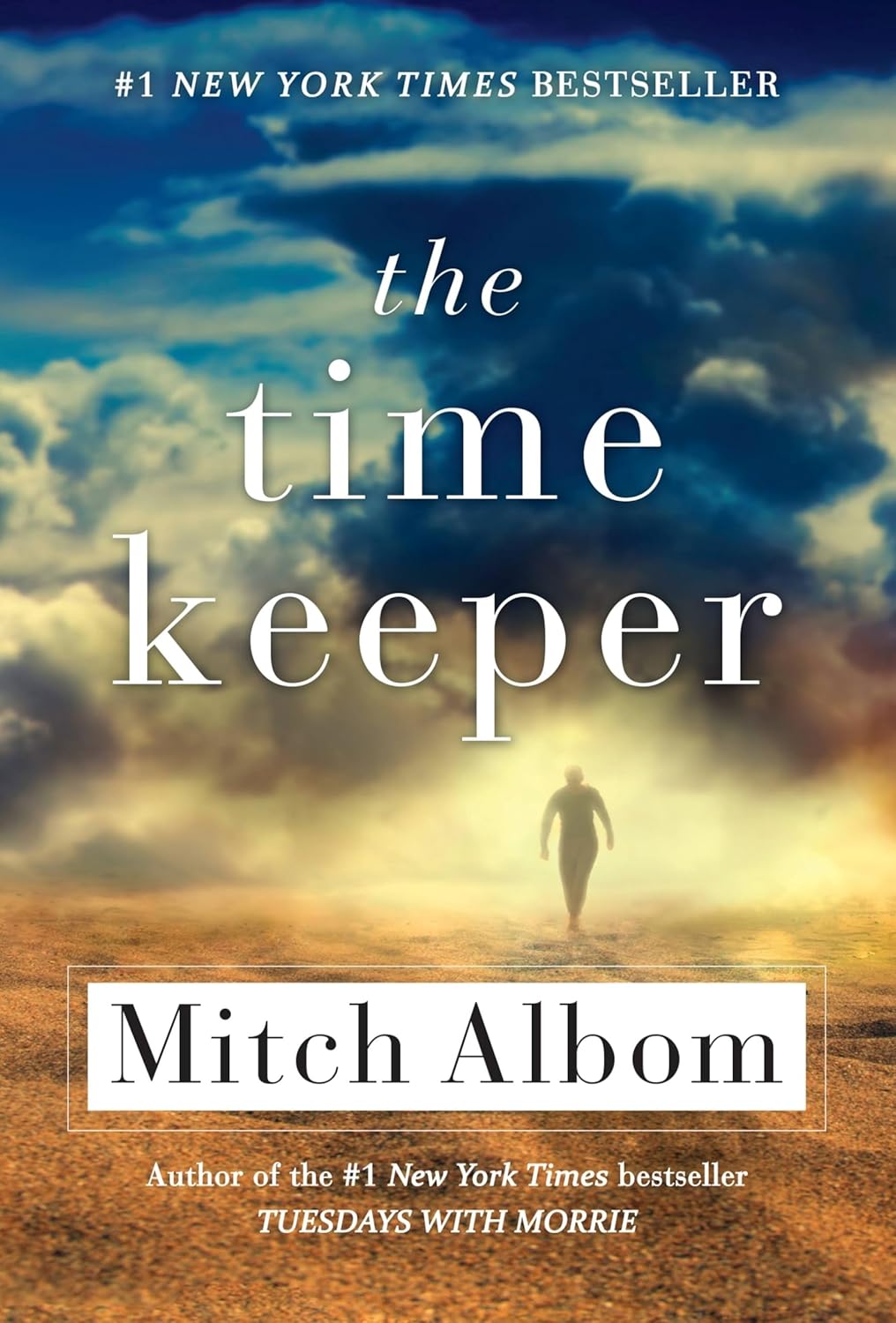The Time Keeper By Mitch Albom Book Review
If you click a link in this blog post and make a purchase I may receive a sponsored commission at no extra cost to you and this will help us to continue sharing this ministry.
Time is something we all wish we had more of, yet something we constantly waste or worry about. We rush through the day, count down hours until the weekend, and stress when we feel like time is slipping away. But have you ever stopped to really think about what time means or how differently we’d live if we saw it through God’s eyes?
That’s exactly what Mitch Albom’s The Time Keeper invites us to do. This beautiful and thought-provoking novel is more than just a story it’s a reflection on life, love, mortality, and the meaning of time itself.
Mitch Albom, known for his bestselling books like Tuesdays with Morrie and The Five People You Meet in Heaven, has a gift for blending storytelling with spiritual truth. In The Time Keeper, he takes readers on an imaginative journey that connects the ancient past to the modern present and along the way, helps us rediscover the sacred value of each moment.
Let’s dive into this powerful book and explore why The Time Keeper continues to touch hearts around the world.

CLICK HERE TO BUY BOOK ON AMAZON
1. The Story at a Glance: A Tale That Spans Centuries
The novel begins with a man named Dor, who lives thousands of years ago before the concept of time even exists. Dor is a curious, brilliant thinker obsessed with measuring everything around him. He invents ways to track the sun’s movement and count the passing days.
But his fascination with time becomes his downfall. When tragedy strikes and his wife, Alli, becomes gravely ill, Dor tries to control time to stop it, reverse it, anything to save her. Instead of trusting in divine timing, he becomes consumed by his own invention.
God punishes Dor by turning him into the Father of Time a timeless being who must listen to the cries of humanity begging for more hours, more years, more time. His curse is to hear every prayer and every complaint about time throughout eternity.
It’s a haunting image billions of voices crying, “I don’t have enough time,” or “When will this end?”
Centuries later, God offers Dor a chance at redemption. He sends him back to Earth with a mission: to help two people understand the true meaning of time.
Those two people are Sarah Lemon, a lonely teenage girl ready to end her life, and Victor Delamonte, an aging billionaire who wants to freeze his body and live forever. One is desperate to lose time; the other is desperate to gain it. And Dor must guide them both toward wisdom and toward peace.
2. The Message: We’re All Obsessed with Time
Mitch Albom’s central message is simple yet profound: our relationship with time reveals what we value most.
We spend our lives counting days, measuring success by hours worked, or waiting for the “next season” of life to bring happiness. But in doing so, we often miss the beauty of now.
Through Dor’s eyes, we see humanity’s constant dissatisfaction. People rush through life but complain about aging. They long for tomorrow but mourn yesterday. Albom holds up a mirror to our time-obsessed culture and it’s both convicting and freeing.
As Dor listens to the voices of the world, he realizes how much time controls us. It becomes clear that time itself isn’t the problem; our perspective of it is.
In one of the book’s most memorable lines, Albom writes:
“Man alone measures time. Man alone chimes the hour. And because of this, man alone suffers a paralyzing fear that no other creature endures. A fear of time running out.”
That single thought captures the whole essence of the story that our obsession with controlling time blinds us to the sacredness of life itself.
3. The Characters: Imperfect, Relatable, and Deeply Human
One of the things Mitch Albom does best is create characters who feel real flawed, emotional, and painfully human.
Dor is the heart of the story. As the “Father of Time,” he’s a symbol of humanity’s struggle to understand things meant only for God. His journey from arrogance to humility, from guilt to grace, mirrors our own need for redemption.
When Dor finally returns to Earth after centuries of isolation, he’s deeply moved by human suffering. He feels compassion for those who waste or wish away time, because he’s seen both sides the beauty and the burden of it.
Then there’s Sarah Lemon, a brilliant but insecure teenager. She’s heartbroken, misunderstood, and convinced that her life has no purpose. Her story is raw and emotional a reflection of how easily young people can lose hope when they measure their worth by rejection or social approval.
On the other end of the spectrum is Victor Delamonte, a wealthy man facing his mortality. He has everything money can buy except more time. Terrified of death, he pursues cryogenic preservation, hoping science can give him eternal life. His story exposes the illusion of control and how wealth can’t save us from the inevitable.
These two characters, though from different worlds, share one desperate desire: to change the time they’ve been given. And through Dor’s intervention, they both discover that life’s value isn’t in how much time we have but how we use it.
4. The Themes: Time, Purpose, and Faith
At its core, The Time Keeper is about perspective how our understanding of time shapes our lives, our faith, and our relationships.
Here are a few of the most powerful themes that run through the book:
The Illusion of Control
We often think we can control time manage it, save it, stretch it. But Albom reminds us that time isn’t ours to command. It’s a gift from God, not a possession.
Dor’s punishment teaches us that trying to master time instead of trusting God only leads to frustration. The more we cling to control, the more time slips through our fingers.
The Beauty of the Present
Albom’s storytelling gently nudges readers to slow down and notice life as it happens. Every moment even the painful ones holds meaning.
When Sarah and Victor reach their turning points, both realize that the moments they were trying to escape were actually opportunities to grow, love, and connect.
It’s a reminder to us all: the present is where God meets us.
Mortality and Eternity
Through Victor’s desperate attempt to cheat death, Albom explores the fear that many people carry the fear of endings. But in doing so, he also offers hope. Death isn’t the enemy; it’s part of the design.
The book subtly echoes biblical truth: eternal life isn’t something we can buy or engineer it’s a gift of grace.
Redemption and Grace
Dor’s story is one of redemption. Though his curiosity once led to pride and punishment, God gives him a second chance. And that second chance doesn’t come through power it comes through compassion.
By helping Sarah and Victor, Dor experiences forgiveness and freedom. His story beautifully illustrates that God’s mercy can restore even the most broken pasts.
5. Mitch Albom’s Writing Style: Simple, Poetic, and Profound
One of the reasons Albom’s books resonate so deeply is his writing style. He doesn’t try to impress readers with complicated language or heavy philosophy. Instead, his words are simple, emotional, and direct the kind that linger in your heart long after you finish the book.
Each chapter is short and rhythmic, almost like a heartbeat pulsing between Dor’s ancient world and the modern lives of Sarah and Victor. This pacing keeps the story engaging while giving readers time to reflect.
There’s also a spiritual gentleness in Albom’s storytelling. He doesn’t preach or push religion, but the message of faith, hope, and divine timing is woven naturally throughout. Whether you’re a believer or not, you can’t read The Time Keeper without feeling something stir in your soul.
6. The Turning Points: When Time Stands Still
Without spoiling the ending, it’s safe to say that both Sarah and Victor come to life-changing realizations through Dor’s intervention.
At their lowest points Sarah ready to give up her life and Victor ready to freeze his time literally stops. In that stillness, Dor gives them a glimpse of what their choices will lead to. They see the pain their decisions would cause, the people they would hurt, and the love they would miss.
It’s in that sacred pause that they both understand: time isn’t the enemy. It’s the gift that gives life meaning.
Sarah chooses life. Victor chooses peace. And Dor, having fulfilled his mission, finds redemption. His punishment is lifted, and he’s reunited with Alli his beloved wife in a moment that’s both tender and transcendent.
The ending feels like a deep exhale a release of all the tension and striving. It’s Albom’s way of reminding us that when we surrender our need to control time, we finally find peace.
7. The Emotional Impact: A Quiet Wake Up Call
Reading The Time Keeper feels like sitting down with a wise friend who gently holds up a mirror to your life. It’s not an overly dramatic story, but it’s deeply moving in a quiet, personal way.
You start to notice how often you rush through conversations, wish away weeks, or complain about waiting. You think about how much of your energy goes into worrying about the future instead of enjoying the moment God has placed you in.
By the end, you can’t help but pause and breathe a little slower. You feel grateful for the sunrise, the laughter of loved ones, even the simple gift of being alive.
It’s one of those rare books that doesn’t just entertain you; it changes your perspective. You walk away wanting to live more intentionally to savor time instead of fighting it.
8. Lessons from The Time Keeper
Here are a few timeless lessons the book leaves with readers:
-
Time is sacred. Every second is a gift not something to waste or wish away.
-
You can’t control time. But you can control how you respond to it.
-
Slow down. The moments you rush through may be the ones that matter most.
-
Forgive yourself. Wasting time in regret is still wasting time.
-
Love now. Don’t wait for the “right moment.” The right moment is now.
-
Accept mortality. Death gives life its urgency and beauty.
-
Trust God’s timing. He knows the beginning and the end and everything in between.
Each of these truths is simple, but they carry enormous spiritual and emotional weight. Together, they form the heart of Albom’s message: when you stop trying to master time, you start truly living.
9. Why This Book Matters Today
In our modern world, The Time Keeper feels more relevant than ever.
We live in an age of constant motion calendars packed, notifications buzzing, attention divided. We measure our worth in productivity and panic when we “fall behind.”
Mitch Albom’s story cuts through all that noise. It calls us to be still. To breathe. To remember that life isn’t a race against the clock it’s a sacred journey meant to be experienced, not scheduled.
For anyone feeling burned out, anxious, or weary of chasing the next thing, this book is a gentle invitation to rest in the present moment and trust that God’s timing is perfect.
Conclusion: A Timeless Story With Eternal Truths
At its core The Time Keeper is a story about what it means to be human to love, to lose, to long for more, and to finally realize that “more” was never the answer.
Mitch Albom takes a concept as universal as time and turns it into a parable about faith, redemption, and gratitude. It’s both imaginative and deeply relatable, reminding us that every breath we take is a moment worth cherishing.
The book doesn’t lecture it whispers. It reminds us that we can’t rewind or fast-forward life we can only live it, one heartbeat at a time.
When you close the final page, you’re left with a quiet sense of awe and perhaps a renewed commitment to live fully in the time you’ve been given.
If you’ve ever felt like time is slipping through your fingers… if you’ve ever wished you could turn back the clock or slow it down… if you’ve ever wondered what truly matters when the hours run out The Time Keeper is a book you need to read.
It’s hopeful, poetic, and spiritually awakening. It’ll make you laugh softly, cry quietly, and reflect deeply. But most of all, it’ll leave you with this truth:
“When you are measuring life, you are not living it.”
So pause. Breathe. Look around you. This moment right here, right now is where life is happening. And as The Time Keeper so beautifully reminds us it’s the moments we notice not the ones we count that define who we are.






